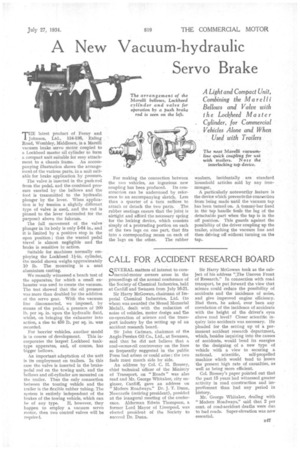CALL FOR ACCIDENT RESEARCH BOARD
Page 65

If you've noticed an error in this article please click here to report it so we can fix it.
SEVERAL matters of interest to commercial-motor owners arose in the proceedings of the annual conference of the Society of Chemical Industries, held at Cardiff and Swansea from July 16-21.
Sir Harry McGowan, chairman of Imperial Chemical Industries, Ltd. (to whom was awarded the Messel Memorial Medal), dealt with the reduction of noise of vehicles, motor design and The co-operation of science and the transport industry by the setting up of an accident research board.
Sir John Cadman, chairman of the Anglo-Persian Oil Co., Ltd., at Swansea, said that he did not believe that a coal-versus-oil controversy on the lines so frequently suggested in the public Press had arisen or could arise ; the two fuels must march side by side.
An address by Col. C. II. Bressey, chief technical officer of the Ministry of Transport, on " Roads " was also read and Mr. George Whitaker, city engineer, Cardiff, gave an address on "Modem Roadways." Dr. J. T. Dunn, Newcastle (retiring president), presided at the inaugural meeting of the conference. Alderman Edwin Thompson, a former Lord Mayor of Liverpool, was elected president of the Society to succeed Dr. Dunn.
Sir Harry McGowan took as the subject of his address " The Uneven Front of Research." In connection with road transport, he put forward the view that science could reduce the possibility of accidents and the incidence of noise, and give improved engine efficiency. Had there, he asked, ever been any correlation of the incidence of accidents with the height of the driver's eyes above road level? Closer scientific inquiry into accidents was necessary. He pleaded for the setting up of a permanent accident research department, which, besides inquiring into the causes of accidents, would bend its energies to the designing of a new type of vehicle with a view to securing a rational, scientific, self-propelled machine which would tend to lessen the present high rate of casualties, as well as being more efficient.
Col. Bressey's paper pointed out that the past 15 years had witnessed greater activity in road construction and improi7ement than had any period in history.
Mr. George Whitaker, dealing with " Modern Roadways," said that 2 per cent, of road-accident deaths were due to bad roads. Super-elevation was now essential.




































































































